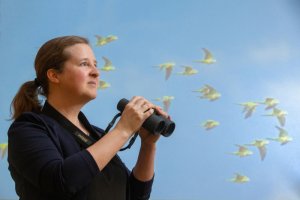Presented By: The Center for the Study of Complex Systems
CSCS Seminar | Leveraging behavioral interactions to identify aspects of social and cognitive complexity in animals
Elizabeth Hobson, Assistant Professor, Department of Biological Sciences, University of Cincinnati

Coffee and snacks will be served.
Event will be recorded for later viewing.
Abstract: In many social species, individuals create their social worlds through interaction decisions and are then subject to and constrained by these social constructs, which can affect an individual’s future actions. Understanding how much individuals “know” about their social worlds is critical in understanding potential feedbacks between sociality and cognition. However, it is difficult to determine how much information individuals have about the social structures in which they live and how much this knowledge interacts with their social and cognitive complexity. In this talk, I summarize several ways my work is addressing these questions by combining empirical experiments with computational approaches to provide insight into cognition through social decisions. I highlight my new work on parakeet aggression and dominance hierarchies to illustrate this approach. I show evidence that parakeet rank is unlikely due to individual characteristics and that group-level social dominance patterns can be plastic and can respond to group membership changes. Finally, I show how parallel or related experiments can allow for comparative analyses across species as well as provide insight into how sociality and cognition may change as individuals age. These approaches, and a taxonomically broad perspective, provide new opportunities to investigate the effect of social information on individual behavior within conflict, and have the potential to provide rigorous evidence for the ecological and evolutionary patterns underlying social cognition.
Event will be recorded for later viewing.
Abstract: In many social species, individuals create their social worlds through interaction decisions and are then subject to and constrained by these social constructs, which can affect an individual’s future actions. Understanding how much individuals “know” about their social worlds is critical in understanding potential feedbacks between sociality and cognition. However, it is difficult to determine how much information individuals have about the social structures in which they live and how much this knowledge interacts with their social and cognitive complexity. In this talk, I summarize several ways my work is addressing these questions by combining empirical experiments with computational approaches to provide insight into cognition through social decisions. I highlight my new work on parakeet aggression and dominance hierarchies to illustrate this approach. I show evidence that parakeet rank is unlikely due to individual characteristics and that group-level social dominance patterns can be plastic and can respond to group membership changes. Finally, I show how parallel or related experiments can allow for comparative analyses across species as well as provide insight into how sociality and cognition may change as individuals age. These approaches, and a taxonomically broad perspective, provide new opportunities to investigate the effect of social information on individual behavior within conflict, and have the potential to provide rigorous evidence for the ecological and evolutionary patterns underlying social cognition.